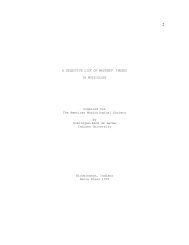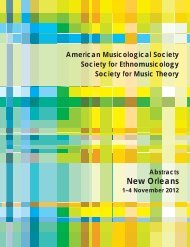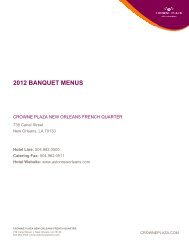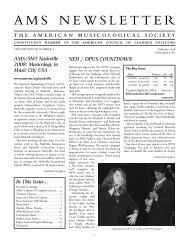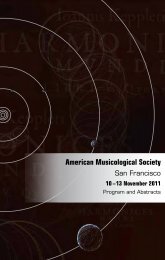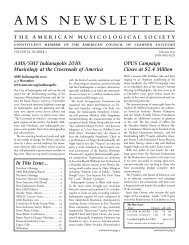AMS Philadelphia 2009 Abstracts - American Musicological Society
AMS Philadelphia 2009 Abstracts - American Musicological Society
AMS Philadelphia 2009 Abstracts - American Musicological Society
You also want an ePaper? Increase the reach of your titles
YUMPU automatically turns print PDFs into web optimized ePapers that Google loves.
164 sunday morning <strong>AMS</strong> <strong>Philadelphia</strong> <strong>2009</strong><br />
“UNWRAPPING” THE VOICE: CATHY BERBERIAN’S<br />
AND JOHN CAGE’S AriA (1958)<br />
Francesca Placanica<br />
University of Southampton<br />
Cathy Berberian is widely known as the “Muse of Darmstadt,” an epithet she earned following<br />
her marriage to Luciano Berio, for whom she was the earliest vocal model. The couple<br />
lived in Milan from 1950 to the early Sixties, when the Studio di fonologia musicale had become<br />
the obligatory stop for composers traveling from all over the world to Darmstadt. In<br />
this artistic milieu, Berberian played a fundamental role, becoming the irreplaceable linguistic<br />
bridge that favored intellectual exchange among international artists. Her vocal and histrionic<br />
skills eventually inspired composers to fashion new compositions on her unique voice and<br />
intelligence.<br />
In this paper I examine the role of Berberian in avant-garde music, exploring unpublished<br />
primary sources preserved in the Cathy Berberian Los Angeles Archive (CBLA) maintained<br />
by Berberian’s daughter, Cristina Berio. The CBLA contains autograph scores, journals,<br />
handwritten annotations, notebooks, drawings in Berberian’s hands, and a lengthy unedited<br />
interview given by the singer in 1981 and recorded on twenty-one tapes. My study of these<br />
hitherto neglected materials sheds new light on the structural role of Berberian’s performance<br />
choices in numerous avant-garde compositions and on the interaction with the composers<br />
who had her as their performer of election.<br />
In particular, I focus on the fertile friendship and collaboration between Berberian and<br />
John Cage, which resulted in the Aria with Fontana Mix (premiered 1958), composed at the<br />
Berios’ in Milan and explicitly dedicated to the <strong>American</strong> singer. Supported by unpublished<br />
evidence, such as Berberian’s recorded voice, annotations, and performance markings on the<br />
autograph score of Aria preserved in the CBLA, my paper traces the story of the composition<br />
of Aria from the perspective of the singer who inspired it, and first faced the challenge of<br />
performing it. Indeed, Berberian assisted Cage suggesting and providing numerous original<br />
linguistic, vocal and dramatic devices, which eventually became structural part of the piece,<br />
deeply affecting its compositional and performing plan.<br />
What emerges from my study is that Berberian’s contribution to the avant-garde vocal<br />
output, as with Cage’s and Berio’s works, was twofold. First, Berberian drove the composer’s<br />
hand while he was writing, suggesting linguistic, dramatic and vocal devices, and assisting him<br />
in molding the written work on her histrionic and vocal skills. Well aware of her own vocal<br />
and dramatic strengths, she was pivotal to the success of the work, as she had the ability to<br />
interpret, embody and deliver at the top of her potential the composer’s intentions. But to a<br />
greater extent, her personal commitment to the performance of a piece, her own research on<br />
and reinvention of the composition once it was “completed,” allowed her to extend the creative<br />
act well beyond the work of the composer himself, taking it all the way to the stage and<br />
the performing momentum.



